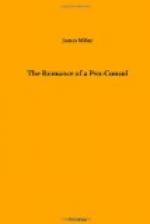‘It is difficult,’ said Sir George, ’to make anybody, who was not in that struggle, understand it. One would have called it simply freakish, if the possible outcome had been less grave. It was a strange fit to seize upon the country, and unfortunately it expressed the view of nearly all the leading statesmen. Cut the painter! You cannot imagine any sensible person of these later, and regenerate, days having such an idea. Throw away Australasia or South Africa! You have heard my retort on such a demand. Who had the right, to tell another man, of the same blood, that he was no longer a Briton, because he lived many sea miles distant? Who could answer that? None! It was all a whimsy, a craze, a nightmare, which will never return—Never, Never!’
Sir George instructed the country, by word and pen, on the true value and destiny of the Colonies. He moved about, a crusader, indignant at separatism, eloquent to knot, and re-knot, the painter. For the slash of the knife he offered federation, and, springing therefrom, a happier, better world altogether. He did not doubt, to his last days, that the peril of the Empire was very real. Neither did he doubt that it was overcome, largely by the wisdom and foresight of the Queen. ’But for her action,’ he declared in so many words, ’events would most probably have ended in the cutting adrift of some of the colonies. She saw true, and clear, and far, as the Prince Consort when alive had seen, and the Anglo-Saxon race has reason to be thankful.’
Wherever he had been, Sir George Grey had endeavoured, in his own phrase, to extend the liberties and right’s of the people. ‘Thus,’ he instanced, ’until I went to the Cape, no judge had been appointed to the supreme court there, except from England. On vacancies occurring, I named two local men, both, I fancy, of Dutch family, thus breaking down a bad custom. I felt that it was impossible to govern a nation upon terms which hurt its manhood and dignity.’ His crusade in England was on a like note, and eventually it found him a parliamentary candidate for Newark.
‘Immediately my friends heard of the vacancy,’ he narrated, ’they proposed that I should stand for it. I did so, an independent Liberal, and I was ostracised by the party leaders, who had another candidate they wanted to get in. I suppose I was too advanced altogether, and indeed I preached a kind of new gospel. It included emigration; a handmaid to federation when the Colonies had ripened. Then I was for free education, and disestablishment all round, as a necessary thing in relation to Christianity—in fact as one of its main doctrines. Farther, I advocated Irish Home Rule, even drafting a short Bill, and in fine I was for a variety of innovations.’
Apart from all else, he understood that his Liberal rival was required in the House of Commons, to help Cardwell with military affairs. Anyhow, he gathered that impression from a visit which Mr. A. J. Mundella, journeying over from Nottingham, paid him at Newark. The encounter supplied a good story, and its manner was Sir George Grey in a characteristic mood. This was how he gravely met Mr. Mundella’s gentle overture, ‘Now, won’t you withdraw from the contest?’




